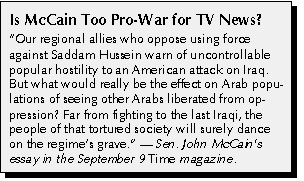 |
|||||||||
|
 |
||
|
 |
||||||||||||||||||||||||
|
||||||||||||||||||||||||
 |
||||||
|
||||||
 |
||||||
|
 |
||||||||||||||||||
|
||||||||||||||||||
 |
||||||||||||||||||||||||
|
||||||||||||||||||||||||
 |
||||||||||||||||||
|
||||||||||||||||||
|
|
|
For Immediate Release: Katie Wright (703) 683-5004 - Tuesday,
September 3, 2002

World News Tonight Ignores Dangers of Inaction on Is ABC's "Road to War?" Really Anti-War?
For the past three weeks, ABC's
World News Tonight has treated viewers to the downside of a still-hypothetical war against Saddam Hussein's regime in Iraq. Rather than showing both sides, ABC's "Road to War?" series has stressed claims U.S. military effort would have damaging consequences, but has not explored the costs of U.S. inaction or the benefits of ousting Saddam. ABC has also showcased war opponents, but has not quoted any of the policymakers outside of administration circles - including media favorites such as Joe Lieberman and John McCain - who support U.S. action. (See box.) • August 15: Anchor Elizabeth Vargas led with the "growing chorus of caution" against action; reporter John Yang summarized the objections of former NSC advisor Brent Scowcroft, former Secretary of State Lawrence Eagleburger, and House Majority Leader Dick Armey, but offered no counterarguments. • August 20: Peter Jennings wondered "whether or not the White House is losing control of the debate about war with Iraq." White House correspondent Terry Moran showcased the objections of the Canadian Defense Minister and former U.N. weapons inspector Scott Ritter. "The White House continues to insist the threat is very real, [but]...if Mr. Bush wants to move militarily, he and his team will have to do a lot better job shoring up support," Moran scolded. • August 21: Jennings asserted "a great many American allies are very opposed to attacking Iraq," listing Saudi Arabia, Jordan, Germany and Russia. Pentagon reporter John McWethy described the difficulties of a hypothetical war without allied support. • August 22: ABC's John Cochran argued that a war would cost U.S. taxpayers $50 to $100 billion and create economic havoc: "Even the optimists say if it were to go on for months, if Saddam Hussein eludes capture, then the cost to the American economy is likely to be heavy." • August 26: ABC led with Dick Cheney's pro-war speech, which Jennings asserted was proof that "the Bush administration...is not pleased with the many objections from overseas or here at home." Jennings also faulted Cheney's vagueness: "He did not put any particular evidence on the table about weapons of mass destruction." • August 27: Cochran reported that even after Bush met with their ambassador, "the Saudis remain unconvinced" that Saddam is an urgent threat. Jennings painted the allies as aggressors: "In Iraq today, American and British warplanes bombarded targets in what are called no-fly zones....The intensity of attacks this week has been far from ordinary, so is it business as usual, or is the U.S. on the road to war?" McWethy later pointed out the bombing was due to "increased Iraqi threats." • August 28: China and India voiced opposition, McWethy reported, and "even the people who would have to do the fighting are asking pointed questions." Jim Sciutto showed chemical weapons drills in Israel amid "fears that U.S. military action in Iraq would mean more Scud attacks." • August 29: Yang highlighted anti-war law professors who "say it would be unprecedented, a violation of the United Nations charter, and a reversal of nearly 200 years of U.S. policy to act only in response to an attack or the immediate threat of one." • September 2: Vargas claimed "increasingly angry U.S. rhetoric against Iraq," but only reported the anti-American scolding delivered by Nelson Mandela. He "is appalled by the U.S. threats," Vargas related. "He said an attack would cause international chaos." All of these anti-war arguments are news, of course, but an unbiased series would have also focused its investigative efforts on Saddam's murderous history and the danger he still poses. It's called balanced reporting. -- Rich Noyes
Home | News Division
| Bozell Columns | CyberAlerts |








